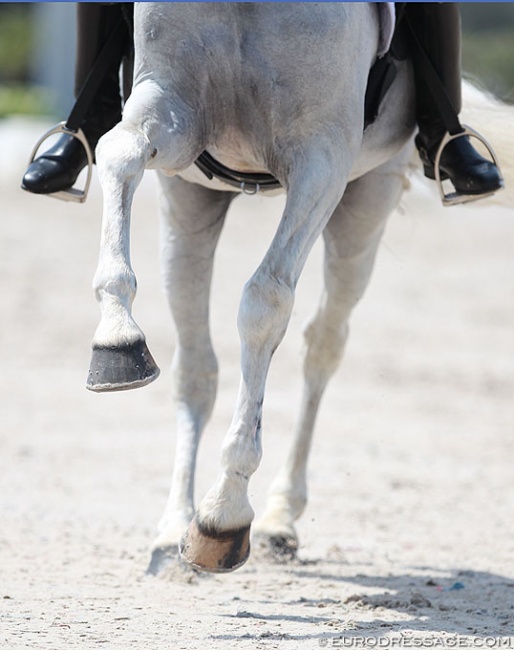
Horse trainers and riders are dependent on their horses’ ability to learn the many different tasks required in equitation. Learning performance does not only depend on genetic inheritance, but is largely affected by the daily environment. Stress resulting from e.g. lack of fulfilment of biological needs, such as company of other horses, access to roughage and free locomotion, do not only lead to impaired health and reproduction but also impaired learning performance. Optimal training is therefore dependent on good horse welfare.
Professor Janet Winther Christensen of the Department of Animal Science at Aarhus University presented the following study at the 2018 ISES Conference in Rome, Italy, last September
The Study
Stress and learning are common words in the vocabulary of most people, e.g. to express how busy one is and to discuss the (poor) state of the public school. The actual definitions of the terms are rarely considered, nor is the link between them. In this plenary, I will argue that both stress and learning are key terms in equitation science. Horse welfare (including good training, good feeding, good housing, good mental state, good health and appropriate beha- viour) is related to reduced stress levels which in turn paves the way for optimal learning. Before considering stress further, it is necessary to reflect on the definition of the term.
Stress is a state, resulting from a stressor (i.e. an internal or external event, involving a real or potential threat to the maintenance of homeostasis; the inner balance of body). Stress responses are all the behavioural and physiological responses aiming to re-establish homeostasis. Thus, the state of stress is reflected in the combined changes in behaviour, nervous system, hormones and immunology.
The body’s stress responses are ideal to overcome acute stressors, such as an attack from a predator, an aggressive conspecific, or short-term extreme weather conditions. Energy is mobilised and delivered to muscles and the most vital organs, pain perception is blunted and expensive anabolic processes are suppressed until the emergency situation is over. From this perspective, stress reactions are adaptive. On the other hand, we all know that stress can make us ill. This is because the body’s stress reactions have evolved to overcome acute, physical stressors. These are the type of stressors that most organisms are exposed to in their natural environment.
Stress-induced illness occurs when the body’s alarm system is activated too often and/or for too long. If the body is constantly mobilising energy through the breakdown of stored protein it leads to breakdown of muscles and results in weakness and fatigue. Other negative effects of frequent/prolonged stress include increased vulnerability to infections and gastric ulcers. It has also been documented that severe or prolonged stressors can have deleterious effects upon broad aspects of cognition, because high levels of glucocoticoids affect neurons within the hippocampus; a brain region central to learning and memory.
Domestic horses can experience a wide range of internal and external stressors, including fear-eliciting and painful stimuli and lack of fulfilment of biological needs (e.g. social company, free locomotion and access to roughage), as well as psychological stressors, such as loss of control and predictability.
Long-term stress of various housing or training conditions may therefore cause marked impairment of learning and memory abilities through the damaging actions of chronically elevated levels of glucocorticoids on brain structure. Optimal learning, however, requires slightly elevated arousal levels acutely, beyond which learning is inhibited. This has been described as the inverted-U relationship between learning and arousal as reflected in the Yerkes-Dodson Law. Accordingly, research has shown that fearful horses generally give poorer performance under stressful conditions, probably because of inattention to the trainer/rider because stimuli in the environment outcompetes the trainer for salience.
The optimal arousal level for a specific task is related to how challenging the task is for the individual; simpler tasks can be performed successfully even at high arousal levels whereas challenging tasks are typically performed more successfully at lower arousal levels. Thus, there is a fine line between elevated stress levels sufficient for learning and responding compared to higher stress levels that inhibit learning. The skill of training using a paradigm of negative reinforcement involves applying this pressure gradient only to the level of optimal learning.
Awareness and identification of this threshold is an important area of study in equitation science and central to this are two major components of psychological stressors: predictability (in horse training classical conditioning provides cues that predict certain events) and controllability (where the animal is able to manage its behavioural outcome, e.g. give a suitable response to reduce pressure from a rider’s legs or reins).
It has further been suggested that arousal and affective states influence the efficiency of each of the four quadrants of operant conditioning, and recent results demonstrate that horses in a positive emotional state show enhanced cognitive flexibility in terms of greater flexibility in the extinction phase of instrumental learning.
There is documentation from several species that enriched environments and sensory stimulation can cause changes in the amygdala and orbitofrontal cortex leading to decreased anxiety and vigilance in both humans and animals. Additionally, studies in a range of mammals has documented improved brain hippocampal neurogenesis during housing conditions with resources and the possibility to perform locomotor behaviour. It is speculated that these positive effects on the brain is an antidote to stress and thereby enhance learning and memory. Recent results in horses showed that curiosity, i.e. the tendency to manipulate novel objects, was positively correlated with perfor-mance in both negatively and positively reinforced learning tests.
Collectively, the current literature demonstrates that stress and learning are interlinked and that optimal training depends on good horse welfare, optimal arousal levels and positive affective states.
- by J.W. Christensen
Source: ISES - Photo © Astrid Appels
Related Links
Maternal Transmission of Behaviour
Roly Owers: "Appropriate Education in the Fitting and Use of Tack is Vital"
Winther Christensen: "Equestrian Sport: the good, the bad and the ugly – and where next?"